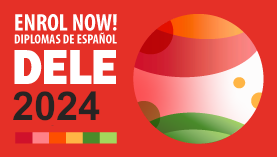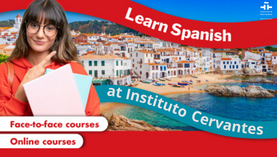About us
The Instituto Cervantes is an institution founded by Spain in 1991 to teach and promote the language and culture of Spain and the Hispanic countries. The Instituto Cervantes is present in over 70 cities in 40 countries, spread across five continents.
His Royal Highness, the King Juan Carlos is the honorary president of the Institution that manages the Instituto Cervantes. The Spanish Government is the executive president of the Institution, in addition is integrated by distinguished representatives of the Spanish literature and culture, as well as the writers awarded with the Premio de Literatura Miguel de Cervantes (Miguel de Cervantes Literature Award).
The Instituto is a point of reference for the teaching training of Spanish as a second language, with more than 11,000 enrollments a year. In almost 10,000 Spanish Courses and seminars, held in Spain and overseas, all our teachers update their linguistic knowledge and teaching techniques. Furthermore, the Institute counts with the Centro de Formación de Profesores en Alcalá de Henares (Training Centre for Teachers) in Alcalá de Henares (Madrid), birth city of Miguel de Cervantes.
Cervantes organizes the exams for the Diplomas in Spanish as a Foreign Language (DELE), an official certificate recognized internationally that certifies the knowledge of Spanish of non Spanish speakers.
From 2008, the institution has its own TV channel on Internet dedicated to inform about the cultural events in Spain as well as those from Hispanic countries, as well as about the activities of the Institute itself.
The radio station Radio Cervantes, also available on-line, boasts a varied programme of contents related to the Spanish language and culture in the Hispanic world.
The Centro Virtual Cervantes has consolidated a huge reference point regarding the Spanish language and culture in Spanish.
The Spanish Virtual Classroom (AVE) offers a complete programme of Spanish in the internet created by the Instituto Cervantes. It is a new open teaching system, accessible, fast and affordable, that allows the student to choose the most appropriate moment, the pace and the place of study. The course contains many interactive teaching materials, as well as personal tutors who assist the student and monitors his/her progress.
Hola ¿Qué tal? is the Spanish course that allows to learn the language making the most of the new digital technology. It is available in different formats: Internet, television and books. It offers TV programmes, an extensive audio archive, a range of around ten thousand interactive activities and a Student Guide.
The Network of Associated Centers integrates institutions dedicated to the teaching of Spanish, both public and private, that are accredited by the Instituto Cervantes. This guarantees the quality and efficiency of the teaching work in accredited centres.
The Oficina del Español en la Sociedad de la Información (OESI) works for the promotion of the language by the internet. To achieve this aim promotes the development of the information technologies and communications, and supports research in the fields more closely related to the so-called Information Society.
The Instituto Cervantes publishes manuals and guides about the teaching of Spanish, yearbooks about the situation of the language in the world, catalogues of the exhibitions that organizes and other publications in collaboration with other institutions.
The Instituto Cervantes co-organizes the International Congress of the Spanish Language. In these forums, hundreds of linguists, writers, publishers, film makers, teachers and other experts debate about the language that gathers more than 400 millions of Spanish speakers. These conferences have been held in Zacatecas (Mexico), Valladolid (Spain), Rosario (Argentina) and Cartagena de Indias (Colombia) to date.





